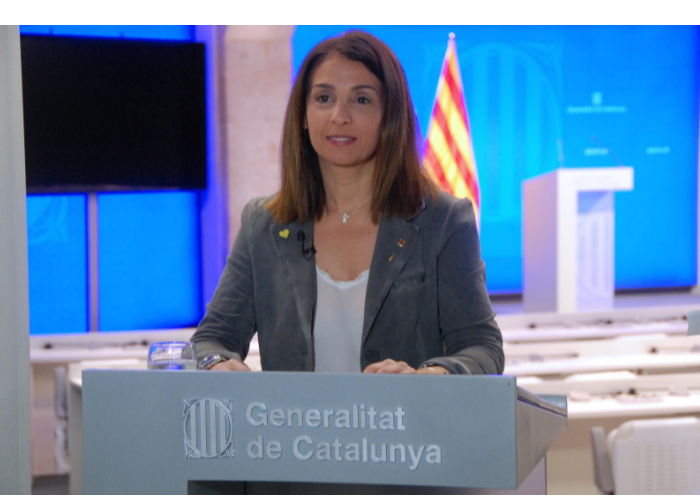- Minister Budó said the capacities of EURECAT university labs will be incorporated into the Catalan government’s Orfeu mass testing programme so that 309,000 PCR tests can be performed in around six weeks
- Minister Buch said the PROCICAT technical committee has approved a schedule to allow different groups to go outdoors in public spaces
- Minister Vergés highlighted the success of a campaign to boost resources available for tackling the health crisis

In yesterday’s weekly meeting, the Executive Council approved a new decree-law that gives the green light to a series of measures, mainly in the areas of labour and taxation, to mitigate the effects of the coronavirus outbreak.
Benefit to cover basic necessities
Government spokesperson Meritxell Budó said employed persons and self-employed workers who have family responsibilities and whose incomes have fallen by more than 30% would receive a one-off €200 benefit to help cover the cost of food, pharmacy products and other essentials.
Other measures adopted
- The Executive Council has lifted the suspension on execution of roadwork, mainly in Lleida, Alt Pirineu and Aran, and Camp de Tarragona.
- The Catalan Tourism Agency has been authorised to contract an advertising campaign to stimulate domestic tourism with the aim of revitalising the sector.
- As an exceptional measure, resources from intestate estates will be used to cover healthcare expenditures.
- The Executive Council approved an agreement that regulates funding of the €700m ICF-COVID-19 financing facility, which is intended to cover the liquidity needs of self-employed workers and companies affected by the coronavirus crisis.
- The capacities of EURECAT university laboratories will be incorporated into the Catalan government’s Orfeu mass testing programme for the detection of Covid-19. Spokesperson Budó: “Mass testing to detect Covid-19 is especially important to ensure public health during the lockdown exit phase.”
- Measures are being taken to ensure that mechanisms are in place to coordinate and monitor the fruit harvest and tackle challenges related to the Covid-19 emergency.
- The Executive Council has approved the regulations implementing the Guaranteed Minimum Income Law. Minister Budó: “Large families and the long-term unemployed over the age of 55 will be entitled to receive the guaranteed minimum income while working part-time, as is the case for single parents at present.”
Plan to ease home confinement
The Minister of Home Affairs, Miquel Buch, said a proposed schedule for allowing different groups to go outdoors in public spaces during the lockdown has been submitted to the PROCICAT steering committee. The minister said addressing the needs of children is the first priority but that the plan could be extended to include other groups in home confinement.
Buch said the plan, which is the end result of “weeks of work” based on the data available, was presented on 18 April. “The central government didn’t respect our proposal, and today we’ve proposed that the time bands be broadened, provided this is compatible with data from the Catalan Ministry of Health. Our priority is to address the needs of vulnerable groups and people suffering as a result of home confinement.”
The Catalan Minister of Health, Alba Vergés, said the proposal on time bands for going outdoors was “the result of coordinated work aimed at striking a balance between the rights of all people during the phase when lockdown measures are being gradually eased”, which she said would last weeks. Vergés stressed that this would be a “complex” process. “Simplistic messages aren’t helpful; this process can be handled well if it’s organised and takes account of everyone’s needs, unlike the central government’s initial proposals.”
The minister also highlighted the success of campaigns to boost resources available for tackling the health crisis. Individuals and companies have made over 5,000 donations to the “Jo Actuo” campaign, including millions of face masks, antiseptic gel and tons of food, as well as cash donations and volunteer work to support hospitals, primary care centres, care homes and temporary medical facilities.
Vergés also drew attention to the work of the Catalan government’s advisory committee on pharmacological treatments for Covid-19, which provides health professionals with up-to-date information on the best treatments for the disease and other relevant scientific developments.
Over 240,000 PCR performed
The health minister said over 240,000 PCR tests have been performed in Catalonia and that this number would continue to grow as new programmes are approved. Over 39,000 of these tests were performed in care homes, and the results have facilitated decision-making and implementation of an action plan aimed at protecting residents and workers at these facilities.
The minister also reported that occupancy of critical care beds in hospitals has continued to fall (reaching 62.7% yesterday). However, she noted that this occupancy rate is based on a capacity that has been tripled since the start of the outbreak and that the system is still under enormous strain. The minister therefore called for a cautious approach and for home confinement measures to be kept in place.
Finally, Vergés said the Catalan Ministry of Health has improved its interactive Covid-19 maps, which provide up-to-date information on the pandemic, including location-specific details of new cases in Catalonia and mortality data.